Covid: All over-50s in Wales to be offered jab by spring
All over-50s and everyone who is at greater risk from Covid will be offered a vaccine by spring, under new Welsh Government plans.
A vaccine strategy unveiled by Health Minister Vaughan Gething aims to offer all adults a jab by the autumn.
It comes after criticism that the rollout of the vaccine has been slower than in other parts of the UK.
The latest figures show 86,039 doses had been administered by 22:00 GMT on Sunday.
A total of 327,000 doses - 280,000 of the Pfizer-BioNTech vaccine and 47,000 doses of the Oxford-AstraZeneca jab - have now been delivered to the Welsh NHS.
The figures mean 2.7% of Wales population has so far been vaccinated - compared to just over 4% in Northern Ireland, about 3.5% in England and 3% in Scotland.
Across the UK nearly 400,000 second doses have been administered, including 374,613 in England, 79 in Wales, 13,949 in Northern Ireland and, as of January 3, 36 in Scotland.
Mr Gething admitted the rest of the UK had "gone slightly faster than we have", but said the latest vaccinations figures showed a "significant acceleration" in the rollout.
The Welsh Conservatives accused the government of a "stuttering start", while Plaid Cymru said the plan was "late in the day".
Everyone over 70, all care home residents and staff, and front-line NHS and social care workers will be offered a jab by mid-February, under similar timescales to other UK nations.
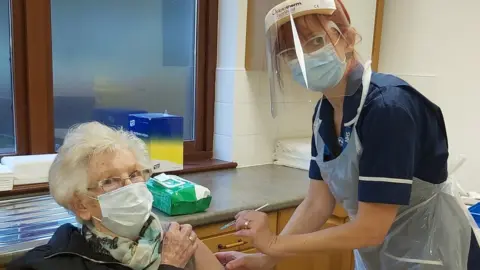 Swansea Bay UHB
Swansea Bay UHBThe Welsh Government's vaccination plans aim to cover 2.5 million people by September, with vaccines supplied by the UK government.
Mr Gething said: "Delivering this vaccination programme to the people in Wales is a huge task but an enormous amount of work is going on to make it a success.
"We are making good progress with thousands more people being vaccinated every day."
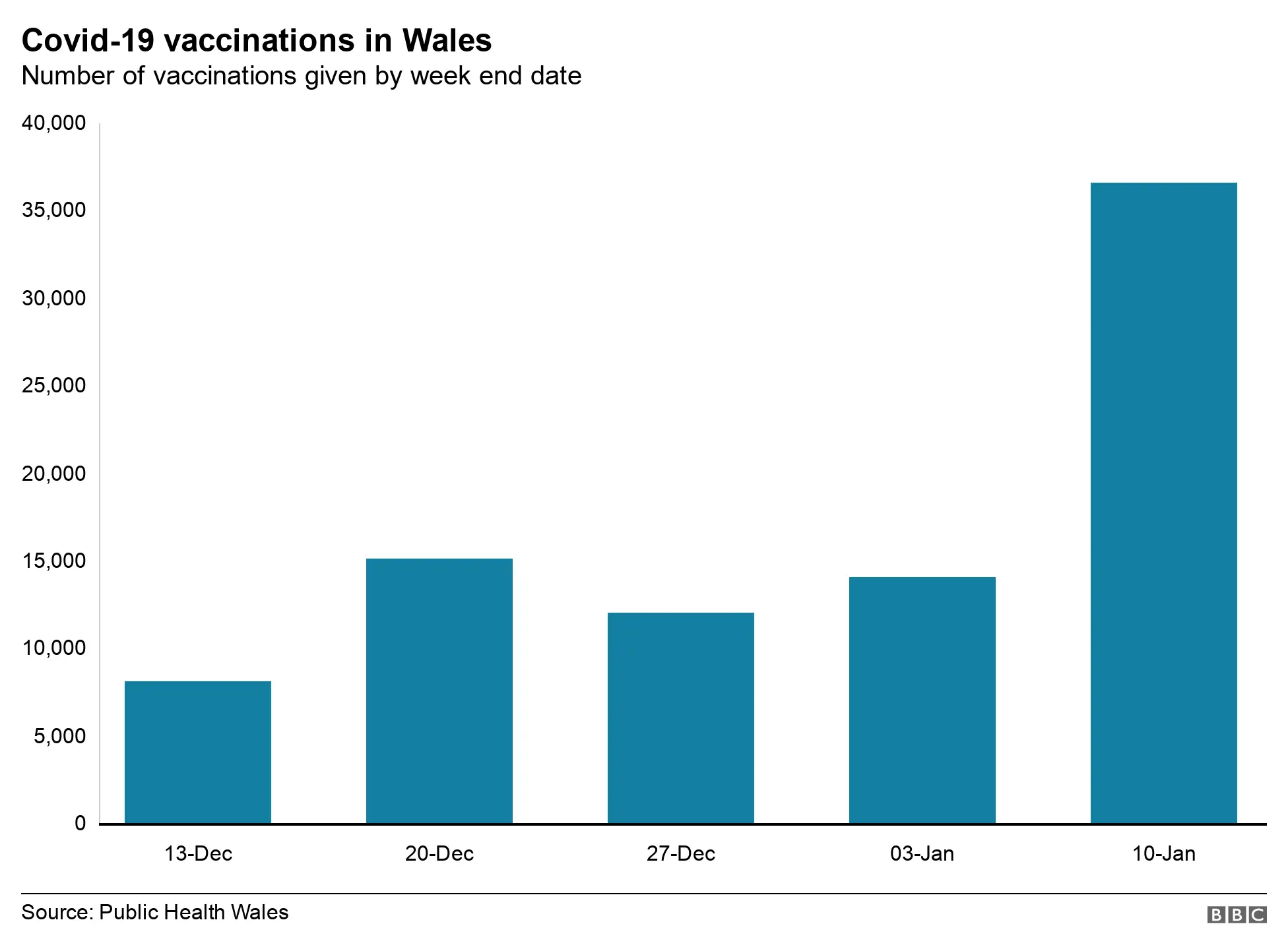

Vaccine in Wales
The plan sets out a series of "milestones" for the vaccine rollout in Wales - all depending on the supply of vaccines approved for use.
At a press conference, Mr Gething said the government aimed to vaccinate:
- all Welsh Ambulance Service staff by 18 January
- all those living and working in care homes by the end of January
- the rest of the top four priority groups - front-line health and social care staff, everyone over 70 and people who are extremely clinically vulnerable - by mid-February
- everyone over 50 and those at greater risk because they have a underlying health condition by the spring
- all "eligible adults" by the autumn
Mr Gething said 700,000 people would be vaccinated by mid-February.
According to the plan, the number of GPs' surgeries delivering vaccines will be increased from around 100 to more than 250 by the end of January.
The number of mass vaccination centres will increase in the next couple of weeks to 35, according to Welsh Government's plan.
One of those is Margam Orangery, in Neath Port Talbot, where about 500 people will be vaccinated each day.
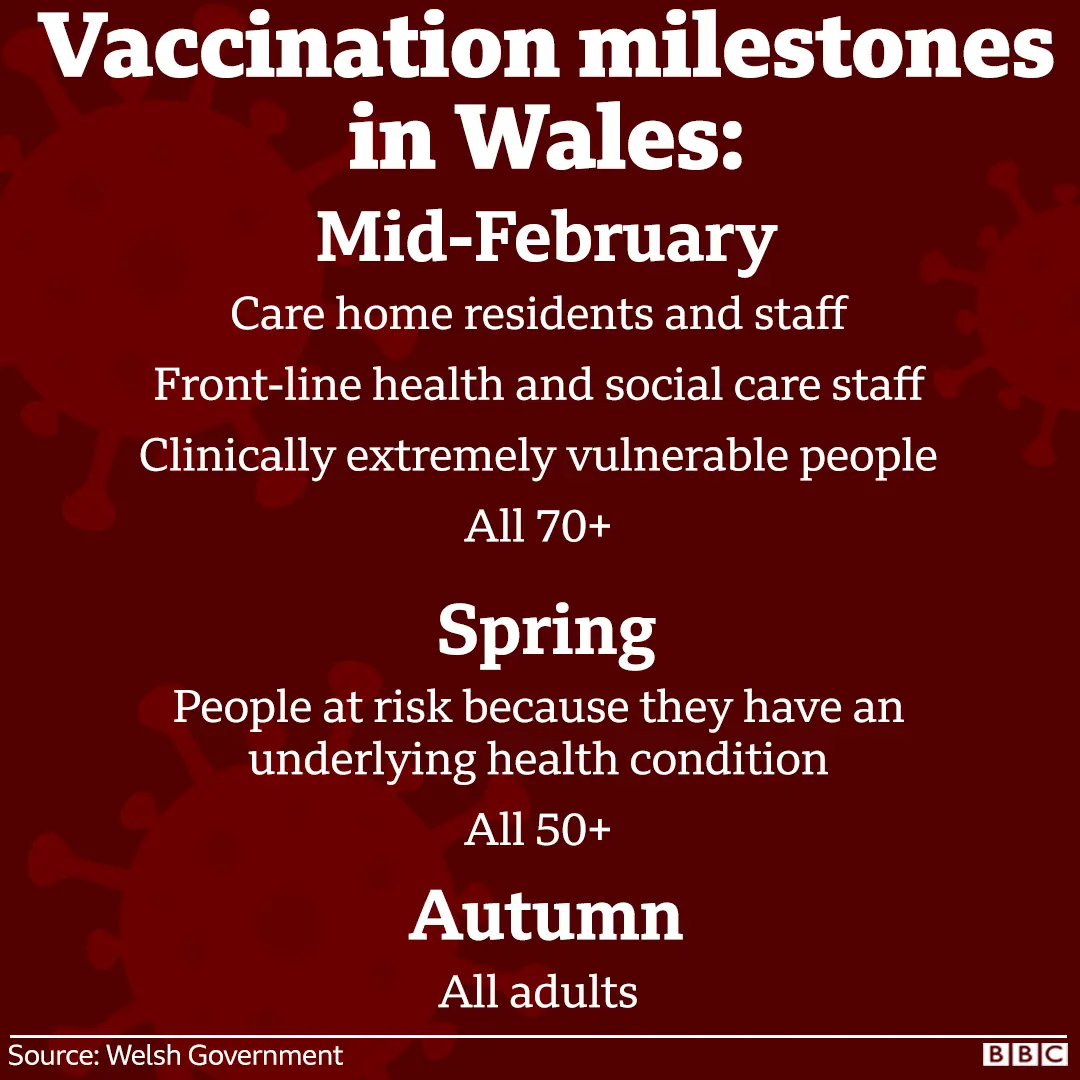
At the press conference, Mr Gething defended the UK-wide decision to increase the gap between giving the two doses of the Pfizer vaccine and said it would "avoid more deaths".
"Each of the vaccines provide a high level of protection against harm from coronavirus. That's really good news for all of us," he added.
Welsh Conservative health spokesman Andrew RT Davies said the Welsh Government should have a vaccinations minister who "gets up in the morning thinking about vaccinations and goes to bed thinking about vaccinations".
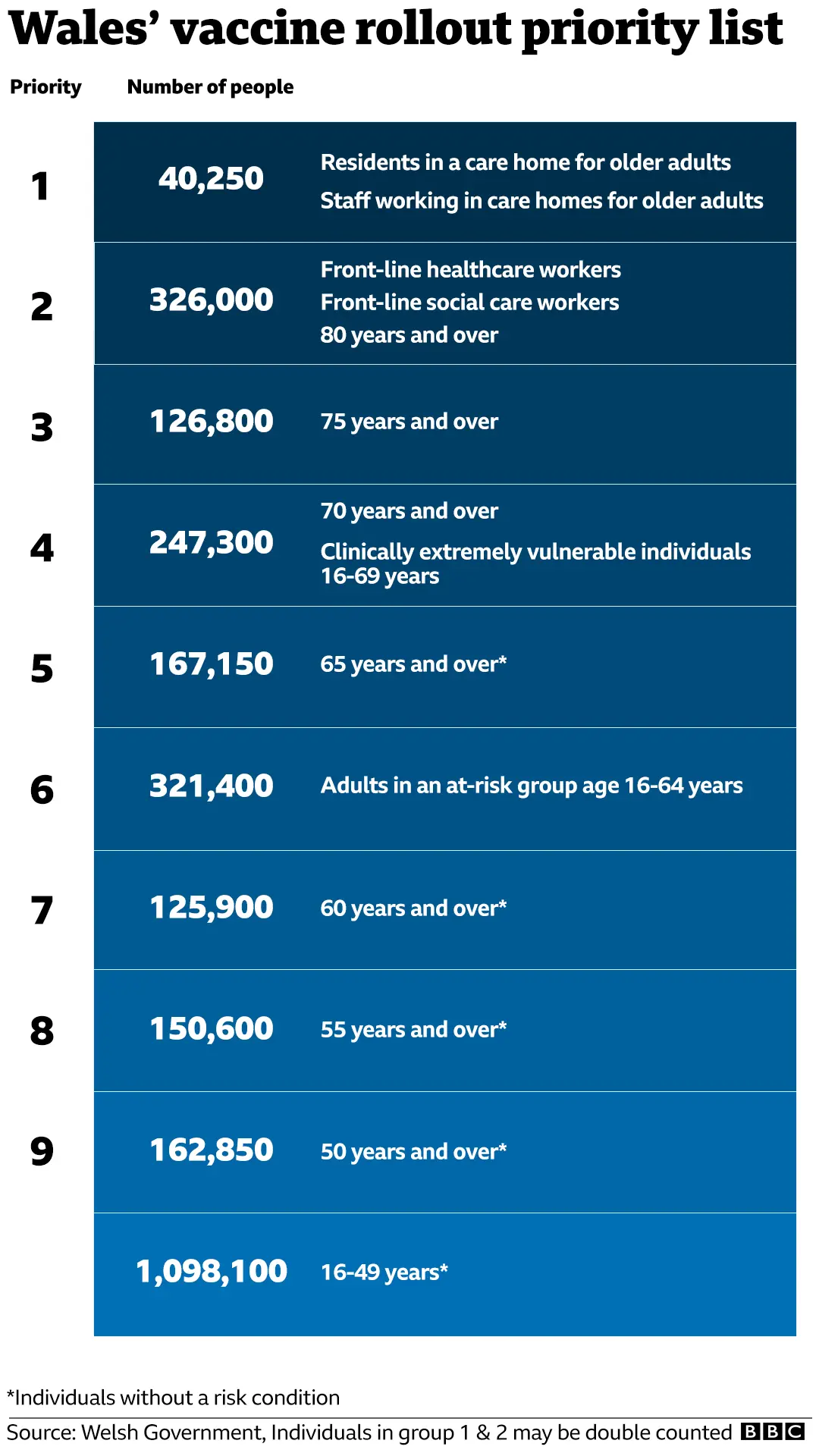
He said such a move would help the government recover from a "stuttering start" to the vaccines programme. Mr Davies said the government needed "focus and direction to drive this forward".
Plaid Cymru leader Adam Price welcomed the strategy but said it was "late in the day".
Mr Price said many people, including his own parents, wanted clarity: "My parents, who are in their 80s, have been told their surgery won't have the ability to vaccinate them for another three weeks, yet the GP surgery next door is starting this week."

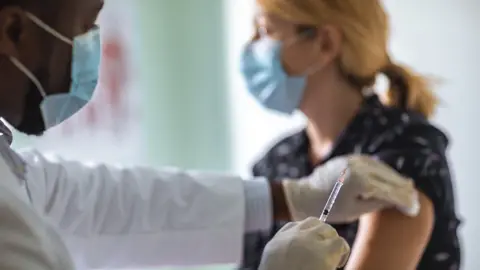 Getty Images
Getty ImagesHow important is Oxford's vaccine?
Daniel Davies, BBC Wales political correspondent
The Oxford-AstraZeneca vaccine is crucial to ensuring everyone aged over 70 can have at least one jab by Valentine's Day.
Health boards plan to use reserves of the Pfizer vaccine, but they alone will not reach the Welsh Government's first milestone. To speed things up, bigger supplies of the Oxford vaccine are needed.
Unlike the Pfizer vaccine however, the stock is not held by the Welsh Government. Instead, it is delivered directly to the frontline - including GPs and community pharmacies - by Public Health England.
Around 24,000 Oxford doses arrived in Wales last week; 26,000 are due this week; and another 80 to 100,000 are expected to arrive in four batches next week.
If the mid-February milestone is reached, attention then turns to the over-50s and younger people whose health puts them at greater risk.
They can expect a dose by the Spring, but discussions are continuing between the four UK nations to nail down a more specific date.

'Really scary'
Dr Helen Alefounder is a GP in Colwyn Bay, Conwy county and part of a team that administered 400 vaccines at care comes last week after receiving the vaccine herself on Wednesday.
"Between us and the surgery next door that we're working with we've got just shy of 20,000 patients to vaccinate," she told BBC Radio Wales.
"It's an absolutely huge task, it's really scary, but we are really keen and committed to get it done because everybody is sick of lockdown and let's be honest, everybody wants life to return to as normal as possible and the only way we're going to do that is to mass vaccinate people."
 Philip Halling | Geograph
Philip Halling | Geograph Other GP surgeries have posted on social media that they have not received as many doses of the vaccine as promised.
Vaccination numbers will now be published daily and the number of mass vaccination centres will rise from 22 to 35. The vaccination plan also suggests pharmacies could be used to deploy the vaccine.
GPs 'raring to go'
Dr Gill Richardson, the senior responsible officer for the Covid vaccination programme in Wales, said GPs were "raring to go" to get the vaccine distributed.
She said the model for Wales' vaccination programme was focused around the Oxford-Astrazeneca vaccine, which was approved in late December and "much larger quantities" were expected.
She also said: "I know it's very difficult if you haven't had a letter and you're feeling anxious but you are going to be approached and when you're approached we'd like it to be as soon as possible and as convenient as possible to you."
Michael Sullivan, 93, from Radyr, Cardiff, is one of those who is yet to receive his letter.
He said: "I hear of all these other people having their second jabs and nobody's even thought of contacting me to say I'm going to have one in the first place. It's a bit depressing. It makes me think somebody's not doing what they should be doing.
"It gets stressful more easily, that's another thing one has to bare in mind - it's going to save my life."
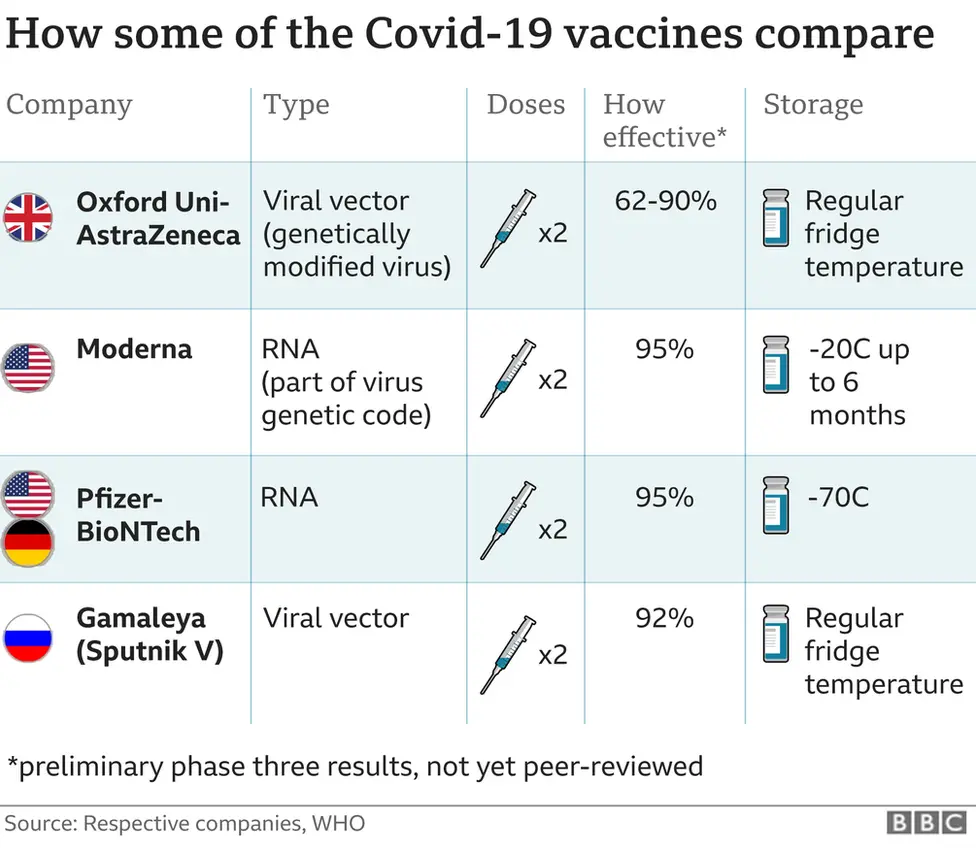
Elen Jones, the Wales director of the Royal Pharmaceutical Society, said community pharmacists were "willing and skilled to help deliver the vaccination programme, as they do with flu every year".
She added pharmacists could help deliver the vaccine "at a more local level".

Welsh ministers have been under intense pressure since it became clear that Wales was lagging behind every other home nation in the initial weeks of vaccine rollout.
It's still not clear why that should be the case - the logistical challenges of rollout and the change in advice over the time period between first and second doses apply across the UK, not just to Wales.
The health minister says that there has already been "a significant step-up in delivery".
The test of that will be whether the system in Wales can meet the delivery goals set out in the vaccination strategy - which (as for the other home nations) also rely on a regular and sufficient supply of vaccine.
